
- Media and resources
Language English
On this page
Travel advisory for the United States of America

Safet travel matters
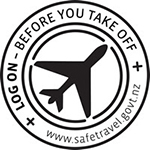
SafeTravel is the official source of travel advice for New Zealanders, with advisories for specific destinations. Checking SafeTravel helps you avoid travel blackspots.
On SafeTravel you can also register your details and travel plans. If a crisis occurs overseas, MFAT will contact New Zealanders who have enrolled to check on their safety and well-being.
We also recommend you take out travel insurance. If you can’t afford travel insurance, you can’t afford to travel.
While you are overseas, make sure you respect cultural norms and obey local laws.
SafeTravel (external link) is the Ministry of Foreign Affairs and Trade website designed for New Zealanders who are travelling or living overseas. You will find:
- traveller’s checklist (external link) to help you plan your journey
- news features (external link)
- travel advisories (external link) for specific destinations, with up-to-date information on security risks
- registration facility (external link) where you can log your travel plans in case you need to be contacted in an emergency
- when things go wrong (external link) - information that may assist you.
US national threat level
For information on the national threat level in the USA, please refer to the Department of Homeland (external link) website.
United States of America: Changes to entry requirements
An Executive Order (external link) on 27 January 2017 has temporarily suspended entry into the United States of foreign nationals from seven countries: Iraq, Syria, Sudan, Iran, Somalia, Libya, and Yemen.
The United States Embassy in New Zealand has confirmed that the Executive Order suspending the entry into the United States for foreign nationals does not restrict the travel of New Zealand dual nationals, so long as they travel on their New Zealand passport and possess a valid United States visa.
We encourage all New Zealanders who require advice on entry into the United States to contact the United States Embassy or Consulate in New Zealand (external link) . The Ministry of Foreign Affairs and Trade is unable to advise on the entry requirements of other countries.
United States (external link)
- Share on Facebook
- Share on Twitter
- Share on LinkedIn
We use cookies and other tracking technologies to improve your browsing experience on our website, to analyze our website traffic, and to understand where our visitors are coming from. You can find out more information on our Privacy Page .
Update April 12, 2024
Information for u.s. citizens in the middle east.
- Travel Advisories |
- Contact Us |
- MyTravelGov |
Find U.S. Embassies & Consulates
Travel.state.gov, congressional liaison, special issuance agency, u.s. passports, international travel, intercountry adoption, international parental child abduction, records and authentications, popular links, travel advisories, mytravelgov, stay connected, legal resources, legal information, info for u.s. law enforcement, replace or certify documents.
Before You Go
Learn About Your Destination
While Abroad
Emergencies
Share this page:
New Zealand
Travel Advisory September 8, 2023
New zealand - level 1: exercise normal precautions.
Reissued with removal of major event information.
Exercise normal precautions in New Zealand.
Read the country information page for additional information on travel to New Zealand.
If you decide to travel to New Zealand:
- Enroll in the Smart Traveler Enrollment Program (STEP) to receive Alerts and make it easier to locate you in an emergency.
- Follow the Department of State on Facebook and Twitter .
- Review the Country Security Report for New Zealand.
- Visit the CDC page for the latest Travel Health Information related to your travel.
- Prepare a contingency plan for emergency situations. Review the Traveler’s Checklist .
Embassy Messages
View Alerts and Messages Archive
Quick Facts
Three months beyond the planned date of departure from New Zealand.
One page required for entry stamp.
New Zealand Electronic Travel Authority (NZeTA) or visa is required.
Border Cash Report required for New Zealand Dollars (NZD) $10,000 or more in cash or foreign equivalent.
Embassies and Consulates
U.S. Consulate General Auckland Citigroup Centre, 3rd Floor, 23 Customs Street East Auckland, New Zealand Telephone: +(64) (9) 303-2724 Emergency After-Hours Telephone: +(64) (4) 462-6000 Fax: +(64) (9) 303-1069 Email: [email protected]
U.S. Embassy Wellington 29 Fitzherbert Terrace, Thorndon Wellington, New Zealand Telephone: +(64) (4) 462-6000 Emergency After-Hours Telephone: +(64) (4) 462-6000 Fax: +(64) (4) 499-0490
Consular services to U.S. citizens are available only at the U.S. Consulate General in Auckland. Consular services are unavailable at the U.S. Embassy in Wellington even in case of emergency. Contact the U.S. Consulate General in Auckland for consular assistance.
Destination Description
Learn about the U.S. relationship to countries around the world.
Entry, Exit and Visa Requirements
New Zealand Electronic Travel Authority (NZeTA):
- U.S. citizens traveling to or transiting through New Zealand under the visa waiver program are required to have an NZeTA . This is also true for cruise ship passengers. It can take up to 72 hours to process an NZeTA so apply well in advance of your trip. The NZeTA is valid for multiple visits for up to two years.
- If your NZeTA application is denied, you will need to apply for a visa. Visit the Embassy of New Zealand website for the most current visa information.
International Visitor Conservation and Tourism Levy (IVL):
- U.S. citizens traveling to New Zealand for tourism, certain student programs, and short-term business trips are required to pay an International Visitor Conservation and Tourism Levy (IVL) . This levy is assessed when a person applies for an NZeTA or New Zealand visa. The IVL is not required of passengers that are transiting New Zealand on a transit visa or transit ETA.
Arrival Information:
- A customs officer at the port of entry into New Zealand may examine items such as mobile phones, iPads, Android tablets, hard drives, laptops, and digital cameras. The officer may ask for your password or ask you to enter it. Fines of up to NZD $5,000 may be enforced for failure to comply. Passwords are not kept, nor is personal data altered.
- New Zealand has very strict biosecurity procedures to prevent the introduction of harmful pests and diseases. All biosecurity-risk goods must be declared or disposed of in marked amnesty bins at airports and seaports. If you do not declare goods considered to be a biosecurity risk, such as honey, fresh fruit, seeds, and plants, you can receive an immediate fine of NZD $400.
The U.S. Department of State is unaware of any HIV/AIDS entry restrictions for visitors to, or foreign residents of, New Zealand.
Cook Islands: Cook Islands is self-governing in free association with New Zealand. U.S. citizen visitors do not require an entry permit for stays up to 31 days. Your passport needs to be valid for at least six months past the arrival date in the Cook Islands.
Find information on dual nationality , prevention of international child abduction and customs regulations on our websites.
Safety and Security
Crime: The crime rate in New Zealand is relatively low, but theft from cars, recreational vehicles, and hostels is common, especially in areas frequented by tourists.
Do not leave passports or other valuable items in unattended vehicles.
Violent crime against tourists is rare; however, if you are traveling alone, you should remain vigilant and be cautious in secluded areas.
International Financial Scams: See the Department of State and the FBI pages for information.
Internet romance and financial scams are prevalent in New Zealand. Scams are often initiated through Internet postings/profiles or by unsolicited emails and letters. Scammers almost always pose as U.S. citizens who have no one else to turn to for help. Common scams include:
- Romance/Online dating
- Money transfers
- Grandparent/Relative targeting
Victims of Crime: For emergencies please dial 111 for Police, Fire and Ambulance. For non-emergencies please dial 105 for Police, and contact the U.S. Consulate General Auckland at +64 4 462 6000.
Remember that local authorities are responsible for investigating and prosecuting crime.
If you are on the Cook Islands, the emergency police number is 999.
See our webpage on help for U.S. victims of crime overseas .
How we can assist:
- Help you find appropriate medical care
- Assist you in reporting a crime to the police
- Contact relatives or friends with your written consent
- Provide general information regarding the victim’s role during the local investigation and following its conclusion
- Provide a list of local attorneys
- Provide our information on victim’s compensation programs in the U.S.
- Provide an emergency loan for repatriation to the United States and/or limited medical support in cases of destitution
- Help you find accommodation and arrange flights home
- Replace a stolen or lost passport
Domestic Violence: U.S. citizen victims of domestic violence are encouraged to contact the Consulate General for assistance.
Tourism: The tourism industry is generally regulated and rules [with regards to best practices and safety inspections] are regularly enforced. Hazardous areas/activities are identified with appropriate signage and professional staff is typically on hand in support of organized activities. In the event of an injury, appropriate medical treatment is widely available throughout the country. Outside of a major metropolitan center, it may take more time for first responders and medical professionals to stabilize a patient and provide life-saving assistance. U.S. citizens are encouraged to purchase medical evacuation insurance .
Local Laws & Special Circumstances
Criminal Penalties: You are subject to local laws. If you violate local laws, even unknowingly, you may be expelled, arrested, or imprisoned. Individuals establishing a business or practicing a profession that requires additional permits or licensing should seek information from the competent local authorities, prior to practicing or operating a business.
Penalties for possessing, using, or trafficking in illegal drugs in New Zealand are severe, and convicted offenders can expect long jail sentences and heavy fines.
In New Zealand, driving under the influence could land you in jail. Roadside sobriety checks by police are common. The blood alcohol limit in New Zealand is lower than that in most U.S. states.
Furthermore, some laws are also prosecutable in the United States, regardless of local law. For examples, see our website on crimes against minors abroad and the Department of Justice website.
Arrest Notification: If you are arrested or detained, ask police or prison officials to notify the U.S. Consulate General immediately. See our webpage for further information.
Natural Disasters and Weather Conditions: Natural disasters occur in New Zealand and include earthquakes, tsunamis, volcano eruptions, and cyclones. In addition, weather conditions can change quickly leaving you stranded or injured, particularly if you are in an isolated area.
- For information on how to prepare for a crisis visit our webpage Crisis and Disaster Abroad: Be Ready.
- For information on seasonal storms visit New Zealand’s Meteorological Service for a Tropical Cyclone bulletin with updated warnings.
- Monitor meteorological websites such as the Joint Typhoon Warning Center .
- Visit MetService for forecasts and official warnings.
- Visit The Department of Homeland Security and the CDC websites for information on how to prepare for a specific natural disaster.
- Always follow the advice of local authorities.
On December 9, 2019, the volcano on Whakaari/White Island erupted while tourists were visiting. This led to numerous casualties, including deaths of U.S. citizens. The volcano remains active and further eruptions are possible. Avoid Whakaari/White Island and follow the advice of local authorities.
There are many areas in New Zealand with active volcanoes. Tourists are encouraged to visit GeoNet for up-to-date information on volcanic alert levels, as well as other geological hazards in New Zealand. As always, follow the advice of local authorities.
The National Emergency Management Agency provides timely information to citizens and visitors through an Emergency Mobile Alert . This service is broadcast from local cell towers to all capable phones in the area and is designed to provide targeted messaging to areas affected by serious hazards. Messages will only be sent when there is a serious threat to life, health, or property.
Adventure Sports: Injuries and death can result from participating in extreme adventure sports, such as bungee jumping, sky diving, hiking, rappelling, climbing, motorcycling, and kayaking. Use caution and common sense when engaging in these activities. Make sure you have travel medical insurance and that it covers your sport.
Never participate in adventure sports alone. Always carry identification and let someone else know where you are at all times. Before kayaking, check the river conditions and wear a life jacket. When hiking, rappelling, or climbing, carry a first aid kit and know the location of the nearest rescue center.
Visit the New Zealand Department of Conservation website for advice and direction on how to safely and legally hike, bike, etc. in New Zealand.
Imports: New Zealand is an island nation, and the government is serious about preserving its delicate ecosystem. The Ministry for Primary Industries (MPI) strictly regulates what can be imported into New Zealand.
- If you do not declare goods that could be quarantined, you can be fined up to NZD $100,000 and/or face up to five years in prison.
- If you do not declare goods considered to be a biosecurity risk, such as honey, fresh fruit, seeds, and plants, you can receive an instant fine of NZD $400.
- When importing a pet, you will need thorough veterinary documentation and a quarantine period will be required.
- The MPI may seize and destroy unfinished wood products, used hiking shoes, gardening tools, fresh food items, and items such as used pet carriers. Thoroughly clean any hiking equipment or sports gear prior to your arrival in New Zealand.
For more information visit the Biosecurity New Zealand website.
Faith-Based Travelers: See the following webpages for details:
- Faith-Based Travel Information
- International Religious Freedom Report – see country reports
- Human Rights Report – see country reports
- Hajj Fact Sheet for Travelers
- Best Practices for Volunteering Abroad
LGBTI Travelers: There are no legal restrictions on same-sex sexual relations or the organization of LGBTI events in New Zealand.
See our LGBTI Travel Information page and section 6 of our Human Rights report for further details.
Travelers with Disabilities: The law in New Zealand prohibits discrimination against persons with physical disability or impairment; any other loss or abnormality of psychological or anatomical structure or function; reliance on a guide dog, wheelchair, or other remedial means; and the presence in the body of organisms capable of causing illness. The law is enforced. Social acceptance of persons with disabilities in public is as prevalent as in the United States. The most common types of accessibility may include accessible facilities, information, and access to services. Expect accessibility to be limited in public transportation, lodging, and general infrastructure.
- Every new building and major reconstruction in New Zealand must provide "reasonable and adequate" access for individuals with disabilities, but be aware that most buildings pre-date this requirement. Most facilities have wheelchair access.
- Many transport operators can provide accessible transport, but most need advance notice so you may want to call ahead to describe your needs. Mobility parking permits are available.
- If you are planning a holiday and need information on facilities for individuals with disabilities, please visit the New Zealand Tourism website.
- Rental, repair and replacement parts for aids/equipment/devices may be limited. Service providers, such as sign language interpreters or personal assistants are available in many areas.
- For more information on the availability of disability services in New Zealand, please visit the disability section of the New Zealand Ministry of Health website.
Students: See our Students Abroad page and FBI travel tips .
Women Travelers: See our travel tips for Women Travelers .
Travelers and crew do not need pre-departure tests or proof of COVID-19 vaccination to enter New Zealand. Please check with your airline or cruise provider as they may still require proof of vaccination.
For emergency services in New Zealand, dial 111 .
Ambulance services and quality medical care are widely available in New Zealand. Waiting lists exist for certain types of treatment. Access to medical care may be less available in rural areas. We do not pay medical bills. Be aware that U.S. Medicare/Medicaid does not apply overseas. Most hospitals and doctors overseas do not accept U.S. health insurance.
Medical Insurance: Make sure your health insurance plan provides coverage overseas. If they do not, consider emergency or comprehensive traveler’s insurance. Most care providers overseas only accept cash payments. See our webpage for more information on overseas coverage. Visit the U.S. Centers for Disease Control and Prevention for more information on type of insurance you should consider before you travel overseas.
We strongly recommend supplemental insurance to cover medical evacuation.
Always carry your prescription medication in original packaging, along with your doctor’s prescription. Check with the government of New Zealand regulations at New Zealand MedSafe to ensure the medication is legal in New Zealand.
Vaccinations: Be up-to-date on all vaccinations recommended by the U.S. Centers for Disease Control and Prevention.
Further health information:
- World Health Organization
- U.S. Centers for Disease Control and Prevention (CDC)
Air Quality: Visit AirNow Department of State for information on air quality at U.S. Embassies and Consulates.
The U.S. Consulate General maintains a list of doctors and hospitals. We do not endorse or recommend any specific medical provider or clinic.
Assisted Reproductive Technology and Surrogacy:
- If you are considering traveling to New Zealand to have a child through use of assisted reproductive technology (ART) or surrogacy, please see our ART and Surrogacy Abroad page .
- Although surrogacy agencies/clinics claim surrogacy is legal in New Zealand, there is little legal framework for foreigners or same-sex couples to pursue surrogacy in New Zealand. As a result, surrogacy agreements between foreign or same-sex intending parents and gestational mothers may not be enforced by New Zealand courts. You may be required to adopt the child before you are given parental rights.
- If you decide to pursue parenthood in New Zealand via assisted reproductive technology (ART) with a gestational mother, be prepared for long and unexpected delays in documenting your child’s citizenship. Be aware that individuals who attempt to circumvent local law risk criminal prosecution.
Adventure Travel: Visit the U.S. Centers for Disease Control and Prevention website for more information about Adventure Travel .
General Health Language: Visit the U.S. Centers for Disease Control and Prevention website for more information about Resources for Travelers regarding specific issues in New Zealand.
Travel and Transportation
Road Conditions and Safety: While in New Zealand, you may encounter road conditions that differ significantly from those in the United States.
Renting a car or a camper is a popular way to enjoy New Zealand's natural beauty, but if you are unfamiliar with local conditions, you should be extremely careful. New Zealand has only 100 miles of multi-lane divided motorways. Most intercity travel is on narrow, two-lane roads. While these roads are in good condition, New Zealand's rugged terrain means motorists often encounter sharper curves and steeper grades than those found on the U.S. Interstate Highway System.
- Use caution to avoid animals when driving in rural areas.
- There is very limited cell phone coverage on large portions of scenic highway in the South Island, which is remote and has little traffic.
- Drivers are advised to review the driving rules and regulations beforehand. For example, pedestrians do not have the right of way except in crosswalks. New Zealand law requires that cars stop at least two meters (approximately 6 feet) from a crosswalk that is in use. Additionally, there is no left-hand turn allowed at a red light. Drivers are reminded to remain cognizant of turning to the left (counterclockwise) when entering traffic circles.
Traffic Laws: All traffic moves on the left in New Zealand, and you should exercise extra caution if you are accustomed to driving on the right.
- Driving on the wrong side of the road is a leading cause of serious injury and death for U.S. tourists.
- Make sure to follow the posted speed limit signs. The speed limits are much lower than those in the United States.
- Proceed carefully through intersections. Traffic circles are common throughout New Zealand. When approaching a traffic circle, always yield to traffic coming from the right--noting that traffic already in the circle has the right-of-way--and merge to the left into the circle. Left turns on a red traffic signal are not permitted.
- New Zealand prohibits driving while texting as well as driving while using a cell phone.
See our Road Safety page for more information. Visit the website of the New Zealand Transport Agency for information about safe driving in New Zealand.
Public Transportation: New Zealand has public transport systems in all major cities and some towns. The public transportation system in New Zealand is generally easy to use and reliable.
Aviation Safety Oversight: The U.S. Federal Aviation Administration (FAA) has assessed the government of New Zealand’s Civil Aviation Authority as being in compliance with International Civil Aviation Organization (ICAO) aviation safety standards for oversight of New Zealand’s air carrier operations. Further information may be found on the FAA’s safety assessment page .
Maritime Travel: Mariners planning travel to New Zealand should also check for U.S. maritime advisories and alerts . Information may also be posted to the U.S. Coast Guard homeport website , and the NGA broadcast warnings .
For additional travel information
- Enroll in the Smart Traveler Enrollment Program (STEP) to receive security messages and make it easier to locate you in an emergency.
- Call us in Washington, D.C. at 1-888-407-4747 (toll-free in the United States and Canada) or 1-202-501-4444 (from all other countries) from 8:00 a.m. to 8:00 p.m., Eastern Standard Time, Monday through Friday (except U.S. federal holidays).
- See the State Department’s travel website for the Worldwide Caution and Travel Advisories .
- Follow us on Twitter and Facebook .
- See traveling safely abroad for useful travel tips.
Review information about International Parental Child Abduction in New Zealand . For additional IPCA-related information, please see the International Child Abduction Prevention and Return Act ( ICAPRA ) report.
Travel Advisory Levels
Assistance for u.s. citizens, new zealand map, learn about your destination, enroll in step.

Subscribe to get up-to-date safety and security information and help us reach you in an emergency abroad.
Recommended Web Browsers: Microsoft Edge or Google Chrome.
Make two copies of all of your travel documents in case of emergency, and leave one with a trusted friend or relative.
Afghanistan
Antigua and Barbuda
Bonaire, Sint Eustatius, and Saba
Bosnia and Herzegovina
British Virgin Islands
Burkina Faso
Burma (Myanmar)
Cayman Islands
Central African Republic
Cote d Ivoire
Curaçao
Czech Republic
Democratic Republic of the Congo
Dominican Republic
El Salvador
Equatorial Guinea
Eswatini (Swaziland)
Falkland Islands
France (includes Monaco)
French Guiana
French Polynesia
French West Indies
Guadeloupe, Martinique, Saint Martin, and Saint Barthélemy (French West Indies)
Guinea-Bissau
Isle of Man
Israel, The West Bank and Gaza
Liechtenstein
Marshall Islands
Netherlands
New Caledonia
North Korea (Democratic People's Republic of Korea)
Papua New Guinea
Philippines
Republic of North Macedonia
Republic of the Congo
Saint Kitts and Nevis
Saint Lucia
Saint Vincent and the Grenadines
Sao Tome and Principe
Saudi Arabia
Sierra Leone
Sint Maarten
Solomon Islands
South Africa
South Korea
South Sudan
Switzerland
The Bahamas
Timor-Leste
Trinidad and Tobago
Turkmenistan
Turks and Caicos Islands
United Arab Emirates
United Kingdom
Vatican City (Holy See)
External Link
You are about to leave travel.state.gov for an external website that is not maintained by the U.S. Department of State.
Links to external websites are provided as a convenience and should not be construed as an endorsement by the U.S. Department of State of the views or products contained therein. If you wish to remain on travel.state.gov, click the "cancel" message.
You are about to visit:
We’re sorry, this site is currently experiencing technical difficulties. Please try again in a few moments. Exception: request blocked
Navigation for News Categories
Us warns against travel to new zealand due to rising covid-19 cases.
The United States' Centre for Disease Control and Prevention has today raised its travel advisory warning on travel to New Zealand.
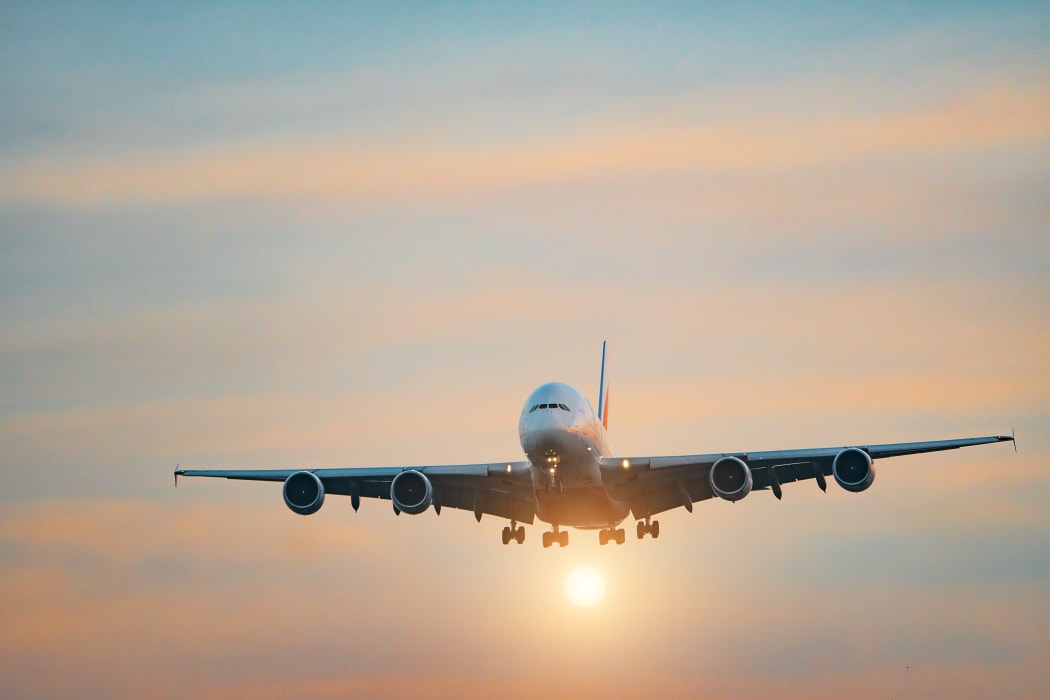
(File image). Photo: 123RF
The CDC updated its travel warning to 'level four: very high' for travel to New Zealand due to Covid-19 cases, of which today alone there was 23,894 new cases recorded .
According to the Reuters' Covid-19 tracker , Covid-19 infections are decreasing in United States, with 49,611 new infections reported on average each day.
The CDC states if people must travel here they should ensure they are up-to-date with their Covid-19 vaccinations.
The health warnings are determined by the "level of Covid-19 in the country or other special considerations".
Some primary criteria for determining the level of the health warning involves looking at the trajectory of new cases and cumulative new cases over the past 28 days per 100,000 population.
The centre also advises travellers to follow all requirements and recommendations in the country if they do travel.
Many countries have been rated with a level four risk warning by the CDC, including Australia. Hong Kong and Thailand were also added to the list today.
Travel restrictions were eased in New Zealand from last week , with returnees now not required to self-isolate upon arrival.
Copyright © 2022 , Radio New Zealand
- Full coverage
Related Stories
Families reunite as borders reopen: 'it's pretty emotional being apart'.
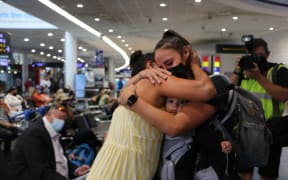
There was a true kiwi welcome at Auckland Airport this afternoon for the first group of New Zealanders returning home under the easing of Covid isolation rules.
Around 900 New Zealanders to arrive without isolation requirements
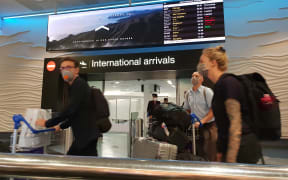
From midnight tonight, fully-vaccinated New Zealand residents and citizens travelling to Aotearoa will no longer need to complete an isolation period for the first time in nearly two years.
Fears border changes may burst domestic travel bubble
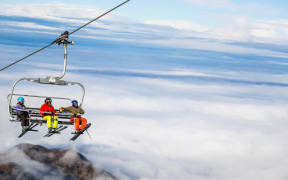
A Methven tourism operator fears the border opening may not result in the economic boom many are forecasting.
'I'll be home soon': Skipping MIQ means NZers can finally return from Australia

The shift from MIQ to home isolation for vaccinated New Zealanders travelling from Australia kicks in today.
Incoming travellers to get pack with 3 rapid antigen tests - Ardern

Prime Minister Jacinda Ardern says travellers coming into New Zealand airports will be issued with a pack including three rapid antigen tests, information and advice.
New Zealand
- Anzac Day: Veterans not getting support they need, feel forgotten about
- High Court overturns Waitangi Tribunal summons to Minister for Children Karen Chhour
- Increase in attacks has Auckland bus drivers worried they may not come home - union
- ADHD expert suspended after wrongly writing thousands of prescriptions
- Wānaka bird deaths: Phenomenon 'not uncommon'
- Greenpeace concerned about high levels of nitrate in Canterbury's drinking water
Get the RNZ app
for ad-free news and current affairs

Top News stories
- What it takes to make a great movie poster
- Aces in their places: Luxon plays coy over ministers' competence
New Zealand RSS
Follow RNZ News
- Share on Facebook
- Share on SMS
- Share on Email
Yes, other countries have issued travel advisories for the U.S.

In response to recent concerns about safety when traveling to Mexico, VERIFY answered questions about crime and safety in the country.
We found that the U.S. Department of State has issued travel advisories ranging from level 2, exercise increased caution, to level 4, do not travel, for most states in Mexico.
This prompted more questions from VERIFY readers about global travel. Several people wanted to know if other countries have issued similar warnings for people traveling to the U.S.
THE QUESTION
Have other countries issued travel advisories for the United States?
THE SOURCES
- New Zealand government’s SafeTravel website
- Australian government’s smartraveller website
- Government of Canada
- United Kingdom government
- France Ministry of Foreign Affairs
- Bolivarian Government of Venezuela
- Uruguay Ministry of Foreign Affairs
- Amnesty International
Yes, other countries have issued travel advisories for the United States.
Sign up for the VERIFY Fast Facts daily Newsletter!
WHAT WE FOUND
Countries around the world have different ways of advising their residents about foreign travel. Some have warnings or advisories similar to those issued by the U.S. State Department .
At least one country currently has a heightened travel advisory in place for the United States. Other countries have also warned against travel to the U.S. in past years due to acts of violence and hate crimes.
While many countries say travelers can take normal safety precautions when visiting the U.S., some provide general warnings about crime.
New Zealand
New Zealand has four levels of travel advisories : exercise normal safety and security precautions; exercise increased caution; avoid non-essential travel; and do not travel.
Its travel advisory for the U.S. falls under level 2 of 4: Exercise increased caution. The country says this designation is “due to the threat of terrorism.” “The United States remains a target of terrorist interest, both from international terror groups and from domestic-based extremists,” New Zealand’s government says. “Credible information assessed by US authorities indicates that individuals or groups have developed both the intent and capability to conduct terrorist attacks in the US. Attacks could be indiscriminate, including places visited by foreigners.”
Canada has four levels of travel advisories : take normal security precautions; exercise a high degree of caution; avoid non-essential travel; and avoid all travel.
Travelers to the U.S. should take normal security precautions , similar to those that they would in Canada, the country’s government says.
But Canada’s government does note that “the rate of firearm possession in the U.S. is high” and “it’s legal in many states for U.S. citizens to openly carry firearms in public.”
“Incidences of mass shootings occur, resulting most often in casualties,” Canada’s government says. “Although tourists are rarely involved, there is a risk of being in the wrong place at the wrong time. Familiarize yourself on how to respond to an active shooter situation.”
The country also warns its residents about the risk of criminal incidents at the U.S.-Mexico border.
Australia also issues travel advice levels ranging from 1 to 4 . The United States falls under the country’s lowest advice level of “exercise normal safety precautions.”
The country’s government does include in its U.S. safety information that “violent crime is more common than in Australia” and “gun crime is also prevalent.”
Australia also warns of a “persistent and heightened threat of terrorist attacks and mass casualty violence in the U.S.,” urging people to stay alert in public places and at events. The United Kingdom
In travel advice published online , the United Kingdom’s government says in part that “violent crime, including gun crime, rarely involves tourists” in the United States.
The country also notes that “incidents of mass shooting can occur, but account for a very small percentage of homicide deaths.” It recommends that people read the U.S. Department of Homeland Security’s advice for what to do during an active shooter event .
France France says the U.S. is “among the safest countries,” but it does warn travelers about some urban areas and an uptick in carjacking incidents throughout the nation.
The French Ministry of Foreign Affairs breaks down potential threats in neighborhoods of major U.S. cities, including Boston, New York, Chicago, Atlanta, New Orleans, San Francisco and Los Angeles, among others.
For example, the ministry recommends for people in Boston to “avoid traveling alone, on foot and at night, in certain parts of Dorchester, Mattpan and Roxbury.”
People traveling to Los Angeles should avoid certain areas, “including the east, south and southeast neighborhoods such as Watts, Inglewood and Florence,” the ministry says.
Venezuela and Uruguay issue warnings in 2019
In 2019, two South American countries issued warnings about travel to the United States.
Venezuela’s government suggested in August 2019 that its citizens postpone trips to the U.S. or take “extreme precautions during them” in the face of the “proliferation of acts of violence and indiscriminate hate crimes.”
The country published its U.S. travel recommendations after a mass shooting at a Walmart in El Paso, Texas , left 22 people dead, and a gunman killed nine people in Dayton, Ohio .
Uruguay’s Ministry of Foreign Affairs also said people traveling to the U.S. should “take extreme precautions in the face of growing indiscriminate violence, mostly due to hate crimes, including racism and discrimination.”
“Given the impossibility of the authorities to prevent these situations, due, among other factors, to the indiscriminate possession of firearms by the population, it is especially advisable to avoid places where there are large concentrations of people, such as theme parks, shopping centers, festivals artistic events, religious activities, gastronomic fairs and any type of mass cultural or sporting events,” Uruguay's ministry said.
Amnesty International warning
Amnesty International, a non-governmental organization focused on human rights, also issued its own travel advisory for the United States in August 2019 due to “ongoing high levels of gun violence.”
The organization said people worldwide should “exercise caution and have an emergency contingency plan when traveling throughout the USA.”
Related Articles
- Yes, some people can have more than one valid U.S. passport
- Fact sheet: What to know about travel warnings for Mexico
The VERIFY team works to separate fact from fiction so that you can understand what is true and false. Please consider subscribing to our daily newsletter , text alerts and our YouTube channel . You can also follow us on Snapchat , Instagram , Facebook and TikTok . Learn More »
Want something VERIFIED?
Text: 202-410-8808
Related Stories

Skiplagging is not a risk-free way to save money on air travel

No, this viral video showing Ford vehicle ‘safety tests’ isn’t real

No, two other bridges were not damaged on the same day as the Baltimore bridge collapse

No, hotel key cards do not store information that can be used to steal your identity

There’s no federal no-fly list for pets

No, personal car insurance doesn’t fully cover rideshare driving
Verify newsletter thank you something went wrong..
An official website of the United States government
Here’s how you know
Official websites use .gov A .gov website belongs to an official government organization in the United States.
Secure .gov websites use HTTPS A lock ( Lock Locked padlock icon ) or https:// means you’ve safely connected to the .gov website. Share sensitive information only on official, secure websites.

COVID-19 international travel advisories
If you plan to visit the U.S., you do not need to be tested or vaccinated for COVID-19. U.S. citizens going abroad, check with the Department of State for travel advisories.
COVID-19 testing and vaccine rules for entering the U.S.
- As of May 12, 2023, noncitizen nonimmigrant visitors to the U.S. arriving by air or arriving by land or sea no longer need to show proof of being fully vaccinated against COVID-19.
- As of June 12, 2022, people entering the U.S. no longer need to show proof of a negative COVID-19 test .
U.S. citizens traveling to a country outside the U.S.
Find country-specific COVID-19 travel rules from the Department of State.
See the CDC's COVID-19 guidance for safer international travel.
LAST UPDATED: December 6, 2023
Have a question?
Ask a real person any government-related question for free. They will get you the answer or let you know where to find it.
Places the U.S. Government Warns Not to Travel Right Now
You may want to reconsider traveling to these countries right now.
Do Not Travel to These Countries

Getty Images
Crime, civil unrest and terrorism are common risk factors for countries that end up on the State Department's "Do Not Travel" advisory list.
In 2024, tourism across the globe is “well on track” to return to pre-pandemic levels, according to projections by UN Tourism.
Global conflicts and natural disasters , ranging from a series of coups across Africa to catastrophic earthquakes in the Middle East affected international travel patterns throughout 2023. Still, international tourist arrivals reached 87% of pre-pandemic levels in 2023, according to estimates by UN Tourism .
In January 2024 alone, about 4.6 million U.S. citizens left the country for international destinations, 17% higher than the same month in 2019, according to the International Trade Administration . But some destinations warrant more caution than others.
On Oct. 19, 2023, following the outbreak of war between Israel and Gaza and flaring tensions in the region, the U.S. State Department issued a worldwide caution advisory due to “increased tensions in various locations around the world, the potential for terrorist attacks, demonstrations or violent actions against U.S. citizens and interests.” Prior to this update, the most recent worldwide caution advisory was issued in 2022 after a U.S. strike killed Ayman al-Zawahiri, Osama bin Laden’s successor as leader of Al Qaeda, causing “a higher potential for anti-American violence.” The worldwide caution advisory remains in effect.
The U.S. State Department also issues individual travel advisory levels for more than 200 countries globally, continually updating them based on a variety of risk indicators such as health, terrorism and civil unrest. Travel advisory levels range from Level 1, which means exercise normal precautions, to Level 4, which means do not travel there.
About 10% of countries – 19 total – have a Level 4: “Do Not Travel” advisory as of Mar. 4. In Level 4 countries, the U.S. government may have “very limited ability” to step in should travelers’ safety or security be at risk, according to the State Department. Crime, civil unrest, kidnapping and terrorism are common risk factors associated with Level 4 countries.
So far in 2024, the State Department made changes to the existing Level 4 advisories for Myanmar, Iran and Gaza, and moved Niger and Lebanon off of the Level 4 list.
Places With a Level 4 Travel Advisory
These are the primary areas the U.S. government says not to travel to right now, in alphabetical order:
Jump to Place: Afghanistan Belarus Burkina Faso Central African Republic Myanmar (formerly Burma) Gaza Haiti Iran Iraq Libya Mali Mexico North Korea (Democratic People's Republic of Korea) Russia Somalia South Sudan Sudan Syria Ukraine Venezuela Yemen
Afghanistan: The Central Asian country is wrestling with “terrorism, risk of wrongful detention, kidnapping and crime,” according to the State Department. U.S. citizens are specifically at risk for wrongful detention and kidnapping. In 2022, the government reinstituted public floggings and executions, and women’s rights are disappearing under Taliban control. The U.S. Embassy in Kabul halted operations in August 2021. Since the Taliban took control , many forms of international aid have been halted . Meanwhile, in 2023, some of the year’s deadliest earthquakes killed more than 2,400 in Afghanistan while the country continues to face a years-long extreme drought.
Belarus: Belarus, which shares a western border with Russia and a southern border with Ukraine, has been flagged for “Belarusian authorities’ continued facilitation of Russia’s war against Ukraine, the buildup of Russian military forces in Belarus, the arbitrary enforcement of local laws, the potential of civil unrest, the risk of detention, and the Embassy’s limited ability to assist U.S. citizens residing in or traveling to Belarus.” The U.S. Embassy in Minsk halted operations in February 2022.
Burkina Faso: Terrorism, crime and kidnapping are plaguing this West African nation. Terrorist attacks may target hotels, restaurants and schools with little to no warning, and the East and Sahel regions of the country are under a state of emergency. In late November 2023, hundreds died in clashes between state security forces and rebels near the country’s border with Mali. In June, more than 2 million people in Burkina Faso were displaced due to “violence linked to al-Qaida and the Islamic State group.”
Central African Republic: While there have not been specific incidents of U.S. citizens targeted with violence or crime, violent crime and sudden closure of roads and borders is common. The advisory states that “Embassy Bangui’s limited capacity to provide support to U.S. citizens, crime, civil unrest, and kidnapping” is a factor in its assessment. Recent data from UNICEF suggests the country has the worst drinking water accessibility of all countries in 2022.
Myanmar (Formerly Burma): Armed conflict and civil unrest are the primary reasons to not travel to this Southeast Asian country, which experienced a military coup in early 2021. Limited health care resources, wrongful detentions and “areas with land mines and unexploded ordnance” are also listed as risk factors. After Ukraine and Israel, Myanmar had the highest conflict-related death toll in 2023.
Gaza : Hamas, a foreign terrorist organization as designated by the State Department, controls much of the Gaza Strip, which shares borders with both Israel and Egypt. On Oct. 7, 2023, Hamas fighters broke across the border into Israel, killing hundreds of civilians and soldiers in a brazen attack that stunned Israelis. On Oct. 10, Israel hit the Gaza Strip with “the fiercest air strikes in its 75-year conflict” according to Reuters . The conflict has since escalated into war between Israel and Hamas, with regular Israeli airstrikes leading to extensive civilian casualties in Gaza. As of mid-December, nearly 85% of Gaza’s population were displaced from their homes, according to UN estimates . The region continues to face shortages of food , water, electricity and medical supplies , with conditions deemed “far beyond a humanitarian crisis.” The State Department warns of terrorism and armed conflict within Gaza’s borders.
Haiti: In July 2023, the Department of State ordered all non-emergency U.S. government personnel and family members to leave the U.S. Embassy in Port-au-Prince in response to the increased risk of kidnapping and violent crime in the country , as well as armed conflict between gangs and police. The travel advisory states that cases of kidnapping “often involve ransom negotiations and U.S. citizen victims have been physically harmed during kidnappings.” The travel advisory also states that “U.S. citizens in Haiti should depart Haiti as soon as possible” given “the current security situation and infrastructure challenges.” A series of gang attacks in late September 2023 caused thousands to flee their homes, and many aid groups have been forced to cut or suspend operations amid escalating violence in recent months.
Iran: Terrorism, kidnapping and civil unrest are risk factors for all travelers to Iran, while U.S. citizens are specifically at risk for “arbitrary arrest.” U.S.-Iranian nationals such as students, journalists and business travelers have been arrested on charges of espionage and threatening national security. Executions in Iran rose sharply between 2021 and 2022, bringing the country’s total to nearly 580 people over the year, according to a report by Amnesty International released in May 2023.
Iraq: The State Department cites “terrorism, kidnapping, armed conflict [and] civil unrest” as cause for the country’s Level 4 distinction. Iraq’s northern borders, and its border with Syria, are especially dangerous. Since the escalation of conflict in neighboring Israel in October, there has been an increase in attacks against Iraqi military bases, which host U.S. troops and other international forces. In October 2023, non-emergency U.S. government personnel and eligible family members were ordered to leave the U.S. embassy in Baghdad.
Libya: Following the end of its dictatorship over a decade ago, Libya has been wrought with internal conflict between armed groups in the East and West. Armed conflict, civil unrest, crime, kidnapping and terrorism are all risk factors. U.S. citizens have been targets of kidnapping for ransom, with terrorists targeting hotels and airports frequented by Westerners. The U.S. Embassy in Tripoli halted operations in 2014. In mid-September 2023, floods, which some say were intensified by climate change , killed thousands in eastern Libya. Clashes between armed factions escalated across the country in the latter half of 2023, including in the capital city of Tripoli and in Benghazi.
Mali: After experiencing military coups in 2020 and 2021, crime, terrorism and kidnapping are all prevalent threats in this West African landlocked nation. In July 2022, non-emergency U.S. government employees and their families were ordered to leave the country due to higher risk of terrorist activity. A U.N. report in August 2023 said that military groups in the country, including both Mali security forces and possibly Russian Wagner mercenaries, were spreading terror through the use of violence against women and human rights abuses. Democratic elections were supposed to occur in February 2024, but Mali’s military junta postponed the plans indefinitely. In December, the U.N. officially ended a decade-long peacekeeping presence in the country, which had been among the agency’s deadliest missions, with hundreds of the mission personnel killed since 2013.
Mexico: Each state in Mexico is assessed separately for travel advisory levels. Six of the 32 states in Mexico are designated as Level 4: Colima, Guerrero, Michoacan, Sinaloa, Tamaulipas and Zacatecas. Crime and kidnapping are listed as the primary risk factors throughout the country. Nearly 112,000 people were missing across the country as of October, a number the U.N. has called “alarming.”
North Korea (Democratic People’s Republic of Korea): U.S. passports are not valid for travel “to, in, or through” this country, home to one of the world's longest-running dynastic dictatorships. The travel advisory states that the Level 4 distinction is due to “the continuing serious risk of arrest and long-term detention of U.S. nationals.” In July 2023, a U.S. soldier fled across the border into North Korea, where he is believed to be in North Korean custody, the first American detained in the North in nearly five years. He was returned to U.S. custody in September 2023.
Russia: The travel advisory for Russia cites its invasion of Ukraine , harassment of U.S. citizens by Russian government officials and arbitrary law enforcement as a few of the reasons for the Level 4 designation. Chechnya and Mount Elbrus are specifically listed as Level 4 regions. Terrorism, civil unrest, health, kidnapping and wrongful detention are all noted as risks.

Russia Invades Ukraine: A Timeline

Somalia: A severe drought resulting from five failed rainy seasons in a row killed 43,000 people in 2022, and caused a famine amid conflict with Islamist insurgents . Violent crime is common throughout Somalia , pirates frequent its coast off the Horn of Africa, and medical facilities, where they exist, have limited capacity. Crime, terrorism, civil unrest, health and kidnapping are all risk factors. In January 2024, some passengers aboard a U.N.-contracted helicopter were taken hostage by al-Shabaab militants after the vehicle crashed in central Somalia.
South Sudan: Crime, kidnapping and armed conflict are the primary risk factors for South Sudan, which separated from Sudan in 2011, making it the world’s newest country . Weapons are readily available, and travelers have been victims of sexual assault and armed robbery.
Sudan: The U.S. evacuated its embassy in Khartoum in April 2023, and the country closed its airspace due to the ongoing conflict in the country, only permitting humanitarian aid and evacuation efforts. Fighting has escalated in the region between two warring generals seeking to gain control after a military coup in 2021 ousted the country’s prime minister. Civil unrest is the primary risk factor for Africa’s third largest country by area. Crime, terrorism, kidnapping and armed conflict are also noted. The International Criminal Court began investigating alleged war crimes and violence against African ethnic groups in the country in 2023. Millions have fled their homes due to conflict, and the U.N. has said its efforts to provide aid have been hindered by a lack of support, safety and resources. As recently as December 2023, the United Nations warned of catastrophic famine , with millions of children at-risk for malnutrition .
Syria: The advisory states that “No part of Syria is safe from violence,” with terrorism, civil unrest, kidnapping, armed conflict and risk of unjust detention all potential risk factors. U.S. citizens are often a target for kidnappings and detention. The U.S. Embassy in Damascus halted operations in 2012. Fighting in neighboring Israel has escalated since October, and the conflict has spilled over into Syria, where the U.S. has carried out air strikes following drone and rocket attacks against American troops in Syria and Iraq, triggered by the Israel-Hamas war.
Ukraine: Russian setbacks in their invasion of Ukraine buoyed hopes in Ukraine in 2023. However, Ukraine is a Level 4 country due to Russia’s invasion, with crime and civil unrest also noted as risk factors. The country’s forces shot down two Russian fighter jets on Christmas Eve 2023, in a move Ukrainian President Volodymyr Zelenskyy said “sets the right mood for the entire year ahead.”
Venezuela: Human rights abuses and lack of health care plague this South American nation, which has been in a political crisis since 2014. In 2019, diplomatic personnel were withdrawn from the U.S. Embassy in Caracas. Threats in the country include crime, civil unrest, kidnapping, wrongful detention and poor health infrastructure.
Yemen: Six of the nine risk factors defined by the State Department – terrorism, civil unrest, health risks, kidnapping, armed conflict and landmines – are all present in Yemen. Despite private companies offering tourist visits to the Yemeni island of Socotra, the U.S. government argues those arranging such visits “are putting tourists in danger.” Civil war and cholera are also both present throughout the country. The U.S. Embassy in Sanaa halted operations in 2015. The country has experienced a relative lull in the civil war fighting, but as peace negotiations have gotten traction, flare ups in the fighting have jeopardized progress. Most recently, the U.S. and U.K. have carried out a series of airstrikes in the country, targeting Iran-backed Houthi sites.
Other Countries to Watch
Since Jan. 1, the State Department has updated travel advisories for 17 different countries as well as for the West Bank and Gaza, adding information about specific regions or risk factors, or simply renewing an existing advisory. Travel advisory levels can change based on several factors in a nation, such as increased civil unrest, policies that affect human rights or higher risks of unlawful detention.
The State Department has given about 25 countries an assessment of Level 3, meaning it recommends people “reconsider travel” to those destinations.
On Oct. 14, one week after the deadly Hamas attack on Israel, Israel and the West Bank were both moved from Level 2 to Level 3, while Gaza remains at Level 4. The region’s travel advisory was updated in November to reflect travel restrictions for certain government employees who have not already left the area, and it was updated again on Jan. 3.
Following the outbreak of the Israel-Hamas war in early October, the U.S. State Department raised Lebanon ’s travel advisory level from a Level 3 to a Level 4 level due to “the unpredictable security situation related to rocket, missile, and artillery exchanges” between Israel and Hezbollah or other militant groups. In December, the U.S. Embassy in Beirut returned to normal staffing and presence, and on Jan. 29, the country was moved back to Level 3. Crime, terrorism, armed conflict, civil unrest, kidnapping and unexploded landmines are listed as the country’s primary risk factors. However, the country’s borders with Syria and with Israel, as well as refugee settlements within Lebanon, are specifically noted as Level 4 regions.
China became a Level 3 country in late 2020, with an update in December 2022 citing “the surge in COVID-19 cases, arbitrary enforcement of local laws, and COVID-19-related restrictions” as the reason for the advisory. In June 2023, the Hong Kong Special Administrative Region (SAR) was moved from the Level 3 to the Level 2 list, but travelers are still advised to be cautious in the area due to “arbitrary enforcement of local laws.” Meanwhile, Macau remains at Level 3.
Following an attempted coup in August 2023, Niger was elevated to Level 4 in August and the Department of State ordered all non-emergency U.S. government personnel and family members to leave the U.S. Embassy in Niamey. In early January 2024, the overall risk level for the country was lowered back to Level 3. Despite the new classification, the State Department still asks non-emergency government personnel and eligible family members to depart the country.
In mid-December 2023 there was an explosion at Guinea’s main fuel depot which has since affected access to health care and basic goods and services. The country was subsequently designated a Level 3 nation after having previously been Level 2. Concerns about civil unrest, health, crime and fuel shortages impacting local infrastructure were listed as the primary risk factors contributing to the change.
Several Level 3 countries are among the worst countries for human trafficking, as designated by the State Department’s annual Trafficking in Persons Report . Level 3 countries on this list include Papua New Guinea, Guinea Bissau, China and Chad. There are also nine Level 4 countries designated as among the worst for human trafficking: Afghanistan, Belarus, Iran, Myanmar, North Korea, Russia, Syria, South Sudan and Venezuela.
Over 70 countries are currently at Level 2, meaning the State Department recommends travelers “exercise increased caution” when traveling to those destinations.
Botswana became the newest Level 2 country on Feb. 26 after having previously been Level 1, with crime noted as the primary risk factor.
France, which saw nationwide protests throughout 2023, has civil unrest and terrorism noted as risk factors for its Level 2 status, and Sweden’s Level 2 status is associated with risks of terrorism.
The Level 2 travel advisory for the Bahamas was updated in January to reflect water safety concerns. The advisory warns that “activities involving commercial recreational watercraft, including water tours, are not consistently regulated” and notes that government personnel are “not permitted to use independently operated jet-ski rentals on New Providence and Paradise Islands.” It also warns visitors to be mindful of sharks, weather and water conditions. The advisory also says that crime is a primary risk factor with gang-on-gang violence contributing to high homicide rates in some areas. Visitors are asked to “be vigilant” and to not physically resist robbery attempts.
Bangladesh 's Level 2 travel advisory was updated in October 2023 to add a note about the country’s general election , which took place Jan. 7, 2024. The advisory states “demonstrations intended to be peaceful can turn confrontational and escalate into violence.” The U.S. has since claimed the country’s election was not free nor fair.
In November 2023, several Level 2 travel advisories were updated with new cautionary information. The advisory for Ghana was updated to reflect threats against LGBTQI+ travelers specifically, noting “anti-LGBTQI+ rhetoric and violence have increased in recent years.” Meanwhile, the advisory for South Africa was updated in February to note that routes recommended by GPS may be unsafe with higher risk for crime.
Turkmenistan was moved off of the Level 2 list to become the newest addition to the Level 1 list on Jan. 22, meaning normal precautions are recommended but there are no risk factors causing travelers to practice increased caution.
The State Department asks travelers to pay attention to travel advisory levels and alerts , review country information pages for their destinations and read related country security reports before going abroad.
Join the Conversation
Tags: Russia , Ukraine , Travel , Coronavirus , Travel Tips , Israel , Gaza , violence , Civil War , crime , kidnapping
Recent Articles
Best countries.

Education News

Best Countries Rankings
- # 1 Switzerland
- # 5 Australia
- # 5 United States
Health News Bulletin
Stay informed on the latest news on health and COVID-19 from the editors at U.S. News & World Report.
Sign in to manage your newsletters »
Sign up to receive the latest updates from U.S News & World Report and our trusted partners and sponsors. By clicking submit, you are agreeing to our Terms and Conditions & Privacy Policy .
You May Also Like
Switzerland is world's best country.
Julia Haines Sept. 6, 2023

Photos: Best Countries Around the World
Sept. 6, 2023

The 25 Best Countries in the World
Elliott Davis Jr. Sept. 6, 2023

Moldova Brings Criminal Case Against Pro-Russian Gagauzia Leader to Court
Reuters April 24, 2024

EU Parliament Adopts First EU-Wide Rules to Combat Domestic Abuse

Travel alerts
Find out how to receive our travel alert information .
Important information about travel to and from Chicago for April 2024 -October 2025
We've made the difficult decision to extend the pause on our direct services between Auckland and Chicago which was due to resume from 25 October 2024.
Unfortunately, ongoing challenges with the availability of Rolls Royce Trent 1000 engines on our 787-9 aircraft means we haven’t been able to return to our Chicago route in October as expected. We anticipate returning to Chicago when we receive our new 787 aircraft from Boeing, currently expected in the second half of 2025.
Next steps:
👉There's nothing you need to do. We will send you an updated itinerary within the next 5 business days.
👉 Keep an eye on your flight details on the Air NZ app
If your booking was made through a travel agent or third party online agent, please reach out to them directly to confirm your options.
Rethinking your travel plans? Below are your options 👇
Travel credit: Would you rather postpone your journey? You can do so by cancelling your flight and opting for credit through Manage Booking. You'll have a whole year to book your next journey.
Refund: Would you like to change your plans altogether? You can do this by getting in touch with us here .
More information on how to apply for a credit or refund can be found here .
Thank you for your continued support
We know it's not the news you wished for before your travels, rest assured, we're refueling our efforts to ensure your journey takes off as soon as possible 💜
Important information about travel to and from Chicago for April-October
If you hold a booking that includes travel from Auckland to Chicago and is impacted by our latest schedule change, an automated message was sent to you in error with the subject line 'Your flight has been cancelled due to COVID-19'. We kindly ask you to disregard the information in this message.
The following message was also sent to you and is correct:
We've made the difficult decision to pause our direct services between Auckland and Chicago from 31 March to 25 October 2024.
Ongoing global challenges with the availability of Rolls-Royce Trent 1000 engines which are used on our Boeing 787 aircraft operating the Chicago services, mean we have fewer aircraft available to fly.
This impacts your booking.
We will rebook your flight
We will rebook you on another service via a different US port within the next 72 hours. We know it is important for you to get to your destination on time so we'll align this as close to your original schedule as possible. Please be assured we will contact you directly with the new booking details, there is nothing further for you to do.
If you booked with a travel agent or third party, please contact them directly to discuss new flight options.
If you no longer need to travel
We understand that this change may not suit your needs:
You can choose to cancel your flight and request a credit through Manage Booking . You will have 12 months from the day your credit is processed to book a flight, and another 12 months to travel. For information about credits, please see our website . You can request a full refund of your flight. If you have booked a refundable fare, you can do so through Manage Booking . If this option is not available to you online, please complete a refund request form to cancel your booking and receive a full refund.
More information
We are confident we can get you to your destination on the same day as you planned. If we are not able to rebook you on the same day as your original flight our schedule change policy applies for incidental costs and accommodation. Information about your rights around flight disruptions can be found on our website.
We appreciate your patience and understanding through this period., Our team is working hard to ensure you have flexible options to make your journey with us as seamless as possible.
Disrupt Reimbursement Consideration
If your journey has been disrupted for a controllable reason, e.g. engineering, or crew shortages, and your new itinerary requires you to stay overnight in a place you do not reside, our airport team will be working hard to secure accommodation for you.
Over peak travel periods, availability is extremely limited and you may be required to source your own accommodation.
As a guideline, we recommend $250.00 per room and $90.00 per person, per night for meals. This is a recommended amount only, and all expenses must be reasonable and supported by itemised tax invoice receipts. Please retain all itemised tax invoice receipts, as they are required for reimbursement consideration.
To submit your reimbursement request, please visit here to do so. Alternatively, you can visit here for details on how to submit your claim through our messaging channels.
Europe packing list: Expert reveals items not to pack

Sarah Pollok
Share this article
If you want to fit in, swap your shorts for a pair of long pants. Photo / 123RF
When visiting a new country or city, few of us wish to stand out as a tourist. So, we brush up on the local language, perhaps learn a little about the etiquette and try to “fit in” so we can avoid being treated like a bothersome visitor.
Yet, according to one travel expert, a European can spot us as a foreigner before we can even offer a “ciao”.
How? It’s all to do with the length of your pants.
Cameron Hewitt, a tour guide and co-author alongside famous travel writer Rick Steves, has advised tourists on the one item of clothing that instantly marks someone as a tourist ; shorts.
In a post made on the website Rick Steves’ Europe, Hewitt explains why a pair of shorts is a red flag in Italy .
Titled Practical Packing Tips for the Unfashionable Male’, Hewitt admits he’s no style icon but has advice for packing outfits that are “comfortable practical, and respectful”.
In some cities, this involves leaving your shorts in the suitcase. Italy was one such country, Hewitt wrote, as it’s considered “silly” when grown men wear shorts.
“It’s not ‘offensive’ or ‘insensitive,’ exactly,” he said, adding that it was just “a little strange” as shorts are considered something only worn by children or at the beach.
“What’s more important to you: being comfortable or not looking silly?” he adds, explaining that if it’s hot, he may wear shorts and accept it looks silly but if it’s only slightly balmy, he’ll opt for long pants.
If you’re travelling around a Catholic country, such as Spain or Italy, long pants are also necessary for visiting certain churches.
Writing to an American audience, Hewitt does admit that clothing often isn’t enough to make visitors blend in.
In fact, travellers could be dressed entirely by a European designer but still be identifiable as Americans simply by their body language, demeanour or gestures.
Travellers also warn against this specific shoe
This isn’t the only thing tourists have been advised against wearing while travelling Europe this summer.
Dozens of people have taken to TikTok to share warnings about a specific kind of shoe.
Adidas Sambas may be considered one of the most popular sneakers of 2024, gracing the feet of many celebrities, but there’s a specific reason why they come with a warning.
Many Europeans and people travelling around Europe have shared warnings on TikTok against wearing the fashionable shoe in old cities such as Paris or Lisbon as it’s sole is too slippery.
In one video, TikTok user @sosooyyammm showed a clip of her sister slipping in Lisbon, wearing “the one shoe I told [her] not to bring”.
@sosooyyammm now she understands why u can’t walk with sambas in Lisbon ♬ original sound - SpongeBob background music
The video, which has been viewed more than 9.5 million times, was captioned: “Now she understands why you can’t walk with sambas in Lisbon.”
Another TikTok user claimed wearing the shoe in Europe while it was raining was “suicide” and another claimed they fractured their ankle during a girls’ trip to Budapest because they’d fallen wearing their new Sambas.

Latest from Travel

How the quaint English coastline became a top European attraction
People love it for the sun, sea, surf, celebrity fish and chips and cream tea.

Video shows flight attendant sprinting through plane after shock PA announcement

I’m a travel journalist, here's why I swear by this TikTok hack

The best hotel in the world has just been named. Here's how much one night costs

‘Dark delights’ of Great Barrier Island
- Travel Planning Center
- Ticket Changes & Refunds
- Airline Partners
- Check-in & Security
- Delta Sky Club®
- Airport Maps & Locations
- Flight Deals
- Flight Schedules
- Destinations
- Onboard Experience
- Delta Cruises
- Delta Vacations
- Delta Car Rentals
- Delta Stays
- Onboard Wi-Fi
- Delta Trip Protection
- How to Earn Miles
- How to Use Miles
- Buy or Transfer Miles
- Travel with Miles
- SkyMiles Partners & Offers
- SkyMiles Award Deals
- SkyMiles Credit Cards
- SkyMiles Airline Partners
- SkyMiles Program Overview
- How to Get Medallion Status
- Benefits at Each Tier
- News & Updates
- Help Center
- Travel Planning FAQs
- Certificates & eCredits
- Accessible Travel Services
- Child & Infant Travel
- Special Circumstances
- SkyMiles Help
French Air Traffic Controllers Strike
Due to the call for French Air Traffic Controllers Strike, this may impact travel to/from/through the destination(s) listed below. Check flight status frequently for up-to-the-minute information about your flight plans, or get updates sent directly to your mobile device or by email with On-Time Flight Notification.
Future Travel Rebooking Options:
- A fare difference may apply when the waiver is class to class restrictive and the original booking class is not maintained in the rebooked itinerary.
- When rebooked travel occurs after May 02, 2024, a difference in fare may apply.
- If travel is not able to be rescheduled within these guidelines, customers may cancel their reservation and apply any unused value of the ticket toward the purchase of a new ticket for a period of one year from the original ticket issuance. Applicable fare difference may apply for new travel dates. Final travel must be completed by end of ticket validity.
Conditions and Restrictions
Eligibility only for customers with an Original Ticket Issue Date on or before April 22, 2024. Changes to origins and destinations may result in an increase in fare. Any difference in fare between your original ticket and the new ticket will be collected at the time of booking.
- Investor Relations
- Business Travel
- Travel Agents
- Comment/Complaint
- Browser Compatibility
- Accessibility
- Booking Information
- Customer Commitment
- Tarmac Delay Plan
- Sustainability
- Contract of Carriage
- Cookies, Privacy & Security
- Human Trafficking Statement (PDF)
Travel Alerts
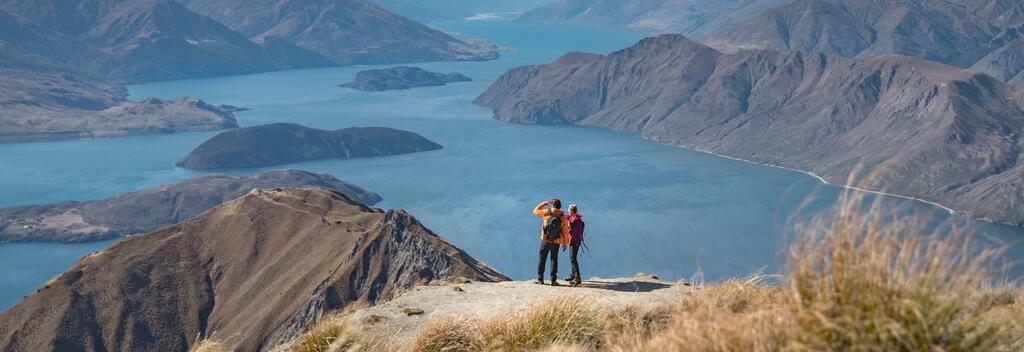
Roys Peak Track, Wānaka
By Miles Holden
Important Travel Alerts for Aotearoa New Zealand
Information for domestic and international visitors
Some parts of New Zealand’s North Island are experiencing changes to road and traffic conditions.
If you are travelling please check with your travel provider, travel agent and travel insurer directly about any disruptions that may impact you.
- If you are already in New Zealand and travelling in throughout the North Island, please stay safe by checking with Waka Kōtahi Transport Agency (opens in new window) about any impacts to roads
- If you have a rental car or a rental campervan, please connect directly to the company if you are having trouble returning your vehicle as planned
- Please also check the Department of Conservation’s alert page (opens in new window) for information about any affected walking trails, beaches, parks and recreation areas
- Some Auckland regional parks are temporarily closed for safety reasons. Find out more here (opens in new window)
- Visitors are asked to stay away from Auckland’s west coast beaches including Muriwai, Piha, Te Henga (Bethells Beach) and Karekare. Learn more here (opens in new window) .
We encourage you to check specific businesses or tourism operators may be operating as normal. Search our site for contact details of tours (opens in new window) , accommodation (opens in new window) and transport (opens in new window) providers.
New Zealand’s isite visitor information network (opens in new window) is also available to talk to you about travel options.
You may also be interested in
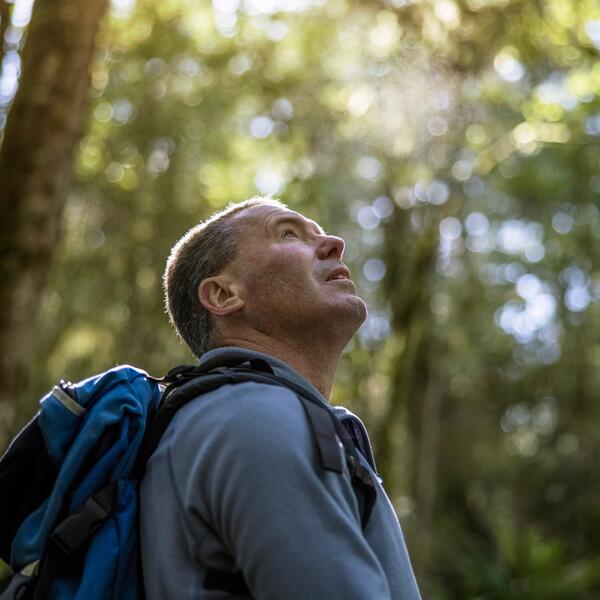
COVID-19 travel safety and information long-arrow-right
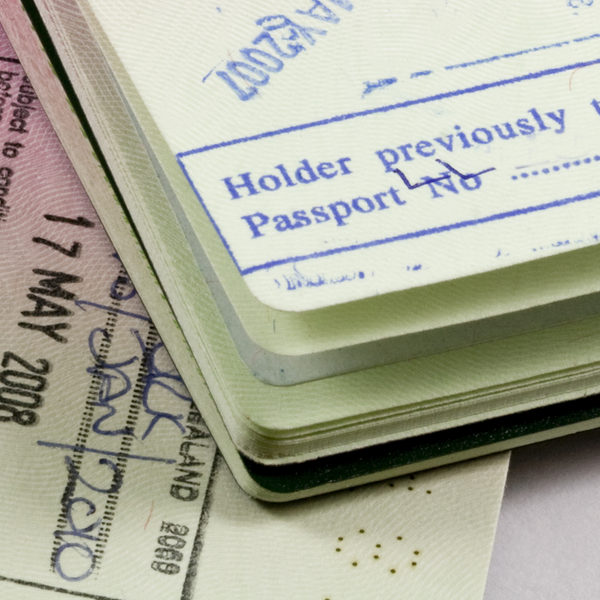
Visas & Immigration long-arrow-right
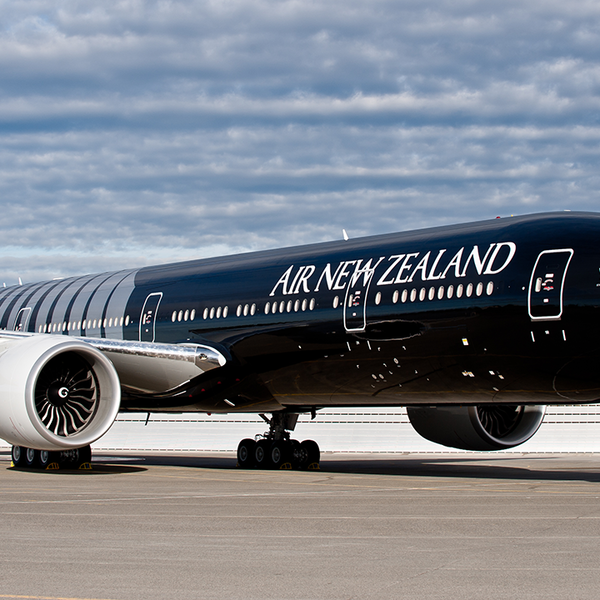
Flights to New Zealand long-arrow-right
US tourists face 12 years in prison for accidentally bringing ammo to Caribbean island
The u.s. state department is warning travelers about strict new laws in turks and caicos islands that carry a mandatory minimum sentence of 12 years for bringing guns or ammunition to the island, by leslie gaydos • published april 23, 2024 • updated on april 23, 2024 at 7:19 pm.
An Oklahoma woman was reunited Tuesday with her young children after being detained for almost two weeks in Turks and Caicos Islands for allegedly violating their strict guns and ammunition law. Her husband is being held in the British Overseas Territory near the Bahamas.
Ryan and Valerie Watson, who live in Oklahoma, left for Turks and Caicos Islands on April 7 to celebrate the 40th birthdays of Ryan and two friends. When they went through security for their return flight, their carry-on was flagged and searched and officials found a Ziploc bag of bullets.
"They were hunting ammunition rounds that I use for whitetail deer," said Ryan, "and I recognized them and I thought, oh man, what a bonehead mistake that I had no idea that those were in there."
The two shared their story virtually with NBC10 Boston last week before their first court hearing. They were stuck on the island, their passports confiscated, separated from their young son and daughter.
Get Boston local news, weather forecasts, lifestyle and entertainment stories to your inbox. Sign up for NBC Boston’s newsletters.
"When I heard that, I immediately was terrified because I was like, we can't both be in prison for 12 years. We have kids at home. And this is such an innocent mistake that we didn't even know we weren't– we didn't even know it was there. So yeah, my immediate thought was our kids and them being, you know, parentless for, for that long," Valerie said.
The Watsons were questioned and charged with possession of ammunition. In 2022, Turks and Caicos passed an amendment with stiffer penalties for possession of weapons or ammunition, increasing the mandatory minimum prison sentence to 12 years.
This is something that we may never recover from Ryan Watson, American tourist charged with possession of ammunition in Turks and Caicos Islands
Responding to your consumer needs and connecting you to your money.
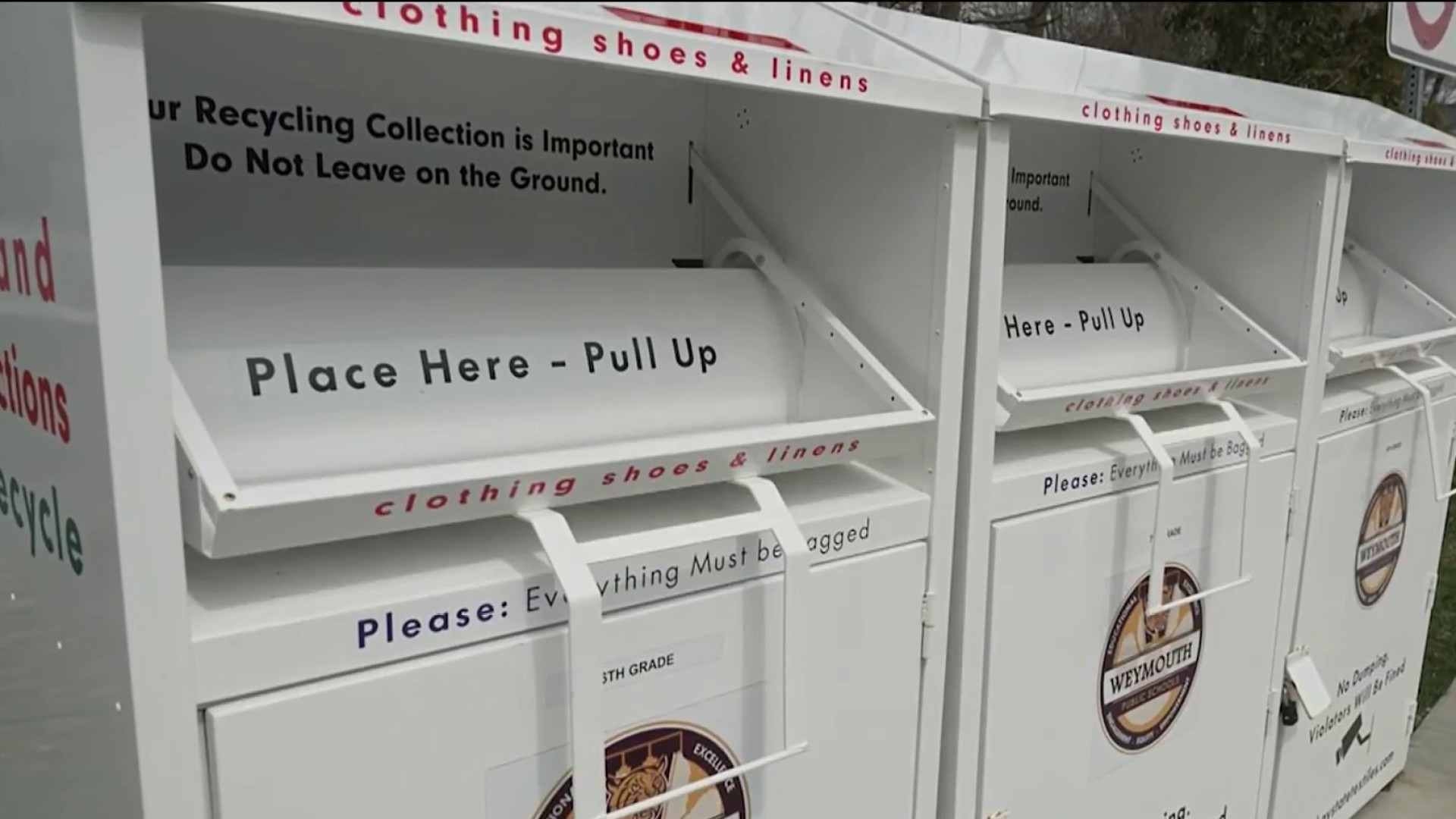
Green ways to get rid of your unwanted clothes and textiles
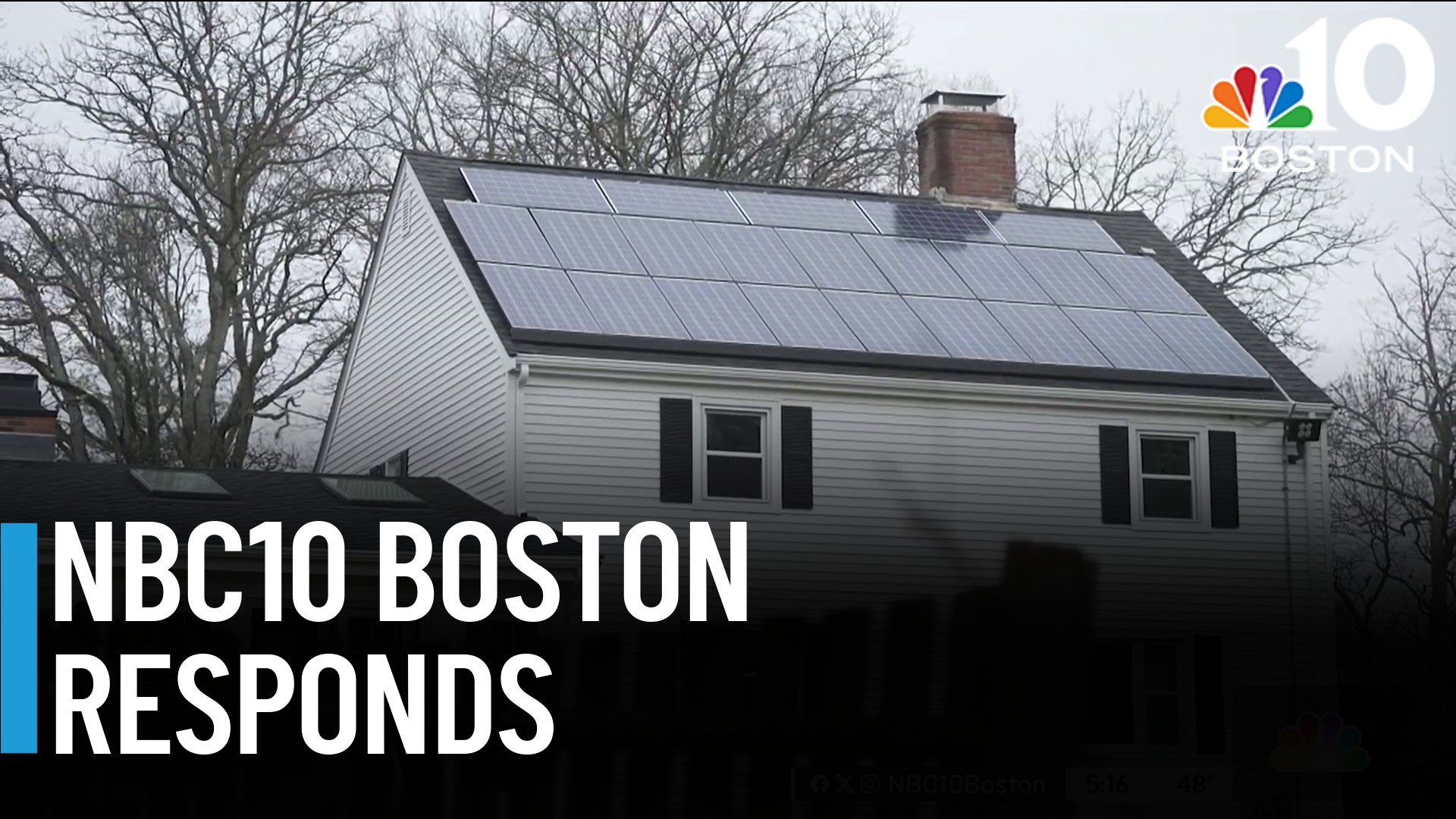
Solar panel problem resolved by NBC10 Boston
Last September, the U.S. Embassy in the Bahamas issued a travel alert warning Americans after a tourist from Indiana got an eight-month prison sentence for possession of ammunition.
The alert says: "We wish to remind all travelers that declaring a weapon in your luggage with an airline carrier does not grant permission to bring the weapon into TCI [Turks and Caicos Islands] and will result in your arrest.
"We strongly encourage you to carefully check your luggage for stray ammunition or forgotten weapons before departing for TCI. If you bring a firearm or ammunition into TCI, we will not be able to secure your release from custody. You are subject to TCI laws and must follow local law enforcement procedures," the alert continued.
Bryan Hagerich was detained by Turks and Caicos authorities after a family vacation in February when hunting ammunition was found in his luggage before he boarded a flight home. He said the ammunition was found in a bag he frequently used for weekend hunting trips.
"I've been here for almost 70 days now after posting bail. I've been out, right now just waiting to go to the hearing. That's where my case would be heard, then following that would be sentencing," Hagerich said.
Hagerich, who played baseball professionally and was once drafted by the Florida Marlins, lives in Pennsylvania with his wife and two young kids. He spent eight days in prison before posting bail and is awaiting a May 3 court hearing.
"It's incredibly scary. You know, you just don't know what the next day may bring. You know, what path this may take. You know, you're in a completely different culture, a different country by yourself. You know, it's certainly a lot different than packing your bags and going away with your family for a few days. It's been the worst 70 days of my life," Hagerich said.
Sign up for our Breaking newsletter to get the most urgent news stories in your inbox.
He and the Watsons are also dealing with the financial strain of paying for an extended stay and being away from their jobs.

"We've already talked, and we're like, what if, you know, what if we lose our house? Which, when we moved to Oklahoma, we built a home that we thought was our forever home. And to think that this is going to ruin us..." said an emotional Valerie.
"This is something that we may never recover from," Ryan said.
"I'm just very anxious, eager to get home to my family," said Hagerich. "This has been too long. You know, it's just had so much irreparable harm to my family, that, you know, I just can't continue to see them struggle anymore. I just want to hug my family and start this healing process together."

After their hearing yesterday, Ryan was sent to jail and is awaiting a bail hearing Wednesday. Charges were dropped for Valerie on Monday and she is now back in Oklahoma with her two children.
The judges in Turks and Caicos Islands are able to make exceptions to the mandatory minimum sentence if they determine there are "exceptional circumstances" in a case.
NBC10 Boston reached out to the U.S. Embassy in the Bahamas and Turks and Caicos Islands' tourism bureau about the Watsons' situation and have not heard back. We contacted the State Department and a spokesperson told NBC10 Boston they are aware of the arrest of U.S. citizens in Turks and Caicos and that, "The U.S. Department of State and our embassies and consulates abroad have no greater priority than the safety and security of U.S. citizens overseas."
The spokesperson added, "When a U.S. citizen is arrested overseas, we stand ready to provide all appropriate consular assistance. In a foreign country, U.S. citizens are subject to that country's laws, even if they differ from those in the United States… As our security alert from September 22, 2023 states, in the Turks and Caicos Islands (TCI), firearms, ammunition, and other weapons are not permitted. TCI authorities strictly enforce all firearms related laws. The penalty for traveling to TCI with a firearm, ammunition, or other weapon is a minimum custodial sentence of twelve (12) years. If a traveler brings a firearm or ammunition into TCI, the U.S. Department of State will not be able to secure their release from custody. Travelers are subject to TCI laws and must follow local law enforcement procedures."
The State Department said they are unable to provide the number of U.S. citizens charged with weapon/ammunition possession since the department is unable to track local arrests.
This article tagged under:
- aid.govt.nz
- mfat.govt.nz
- NZ Embassies

Official advice for New Zealanders living and travelling overseas
- Before you go
- Quick checklist and tips
- Disability information
- Dual Citizenship
- Going to Australia?
- LGBTQIA+ travellers
- Staying healthy while travelling
- Passports and visas
- Solo travellers
- Travel insurance
- Travelling with a criminal conviction
- Work and income benefits
- Travel advisories
- By destination
- Central Asia
- Central/South America
- Travel tips - travel to Europe
- Middle East
- North America
- Travel tips - travel to the United States
- South East Asia
- About our advisories
- Travel advisory risk levels
- News features
- When things go wrong
- Arrest and detention
- Contingency planning for New Zealanders overseas
- Financial difficulties
- Hostage taking and kidnapping
- Illness and injury
- Internet dating scams
- Internet fraud and international scams
- Large-scale emergency
- Lost, stolen or damaged passport
- Missing persons
- Nuclear incident
- Victims of crime
- Family issues
- Child abductions
- Combating sex crimes against children
- Inter-country adoptions
- Travelling with children
- Our services
- New Zealand embassy locator
- Travel advisories /
Page updated:24/7/20 Print page
What do our travel advisories mean?
The Ministry of Foreign Affairs and Trade provides advice on security and safety concerns in many destinations. This advice is based on information from a number of sources. It reflects potential risks, and our assessment of what these might mean for New Zealanders. Our assessment may also take into account actions of local authorities, and our ability to provide you with assistance.
The advice is designed to assist you to make informed decisions about travel destinations. We cannot tell you what to do. But your travel insurance may be affected by the issuing of a strong travel warning or the level of our travel advice (especially if we advise against all travel to a destination). We recommend that, before setting out, you contact your travel insurer to check whether or not you will be covered by your insurance policy if you are travelling to a destination featured in our avoid non-essential travel or do not travel categories. Insurance cover can differ from company to company.
We do not provide advice on all destinations. We focus on those about which we have reliable information on security and safety concerns that may affect New Zealanders. You may also wish to consult the advice of other governments, but be aware that their advice is designed for their citizens.
On 17 August 2018 we altered the headline language attached to our travel advisory levels. We did not change the way in which advisories are prepared, the substance of the advisories, or the thresholds for the different levels. We simply changed our description of the four levels.
The new advice levels correspond to the previous system as follows:
Exercise normal safety and security precautions (previously “no significant security risk”)
Exercise increased caution (previously “some risk”)
Avoid non-essential travel (previously “high risk”)
Do not travel (previously “extreme risk”)
Our four-level system:
Exercise normal safety and security precautions.
There is some risk in any international travel. However we assess that the overall safety and security situation in destinations with this level is similar to that of New Zealand. Exercise common sense and look out for suspicious behaviour, as you would in New Zealand. Do not assume, however, that the local situation will be the same as New Zealand, as local laws and social customs could differ significantly.
Exercise increased caution
This advice usually applies to areas where there are more significant safety and/or security concerns than you would typically find in New Zealand. New Zealanders need to remain conscious of these concerns, although they are unlikely to affect the majority of New Zealanders in these areas. You should pay close attention to your personal security at all times.
Avoid non-essential travel
This advice usually applies to areas where there are sustained or serious safety and/or security concerns which pose significant risks. If you are in one of these areas you should take your personal circumstances into account and if you have concerns for your safety, consider departing. You should think seriously about your need to travel to these places, including deferring any non-essential travel or choosing a less risky destination. In the event of a crisis, you are responsible for ensuring you can depart independently, as you should not expect that the New Zealand Government will facilitate your departure.
Do not travel
This advice usually applies to areas where there is conflict, warfare or ongoing violent civil unrest, or we have reason to believe there is a heightened threat to New Zealanders. New Zealanders in these areas should be aware of the limits on consular assistance that can be provided. The New Zealand Government may not be able to assist you if you are detained, injured or otherwise prevented from leaving these areas. If you are in one of these areas you should consider departing as soon as it is safe to do so. The New Zealand Government will not assist with facilitating travel to these areas and you should not expect that the New Zealand Government will facilitate your departure.
Top of page
Other pages in this section:
Ministry of Foreign Affairs and Trade 195 Lambton Quay Private Bag 18 901 Wellington 5045 New Zealand
- About this site
- Accessibility

An official website of the United States government
Here’s how you know
Official websites use .gov A .gov website belongs to an official government organization in the United States.
Secure .gov websites use HTTPS A lock ( Lock A locked padlock ) or https:// means you’ve safely connected to the .gov website. Share sensitive information only on official, secure websites.
Free Cyber Services #protect2024 Secure Our World Shields Up Report A Cyber Issue
Joint Guidance on Deploying AI Systems Securely
Today, the National Security Agency’s Artificial Intelligence Security Center (NSA AISC) published the joint Cybersecurity Information Sheet Deploying AI Systems Securely in collaboration with CISA, the Federal Bureau of Investigation (FBI), the Australian Signals Directorate’s Australian Cyber Security Centre (ASD ACSC), the Canadian Centre for Cyber Security (CCCS), the New Zealand National Cyber Security Centre (NCSC-NZ), and the United Kingdom’s National Cyber Security Centre (NCSC-UK).
The guidance provides best practices for deploying and operating externally developed artificial intelligence (AI) systems and aims to:
- Improve the confidentiality, integrity, and availability of AI systems.
- Ensure there are appropriate mitigations for known vulnerabilities in AI systems.
- Provide methodologies and controls to protect, detect, and respond to malicious activity against AI systems and related data and services.
CISA encourages organizations deploying and operating externally developed AI systems to review and apply this guidance as applicable. CISA also encourages organizations to review previously published joint guidance on securing AI systems: Guidelines for secure AI system development and Engaging with Artificial Intelligence . For more CISA information and guidance on securing AI systems, see cisa.gov/ai .
This product is provided subject to this Notification and this Privacy & Use policy.
Please share your thoughts
We recently updated our anonymous product survey ; we’d welcome your feedback.
Related Advisories
Cisa adds one known exploited vulnerability to catalog, cisa releases two industrial control systems advisories, cisco releases security advisories for cisco integrated management controller, cisa releases three industrial control systems advisories.
FAA lifts temporary ground stop of Alaska Airlines flights after technical issue is resolved
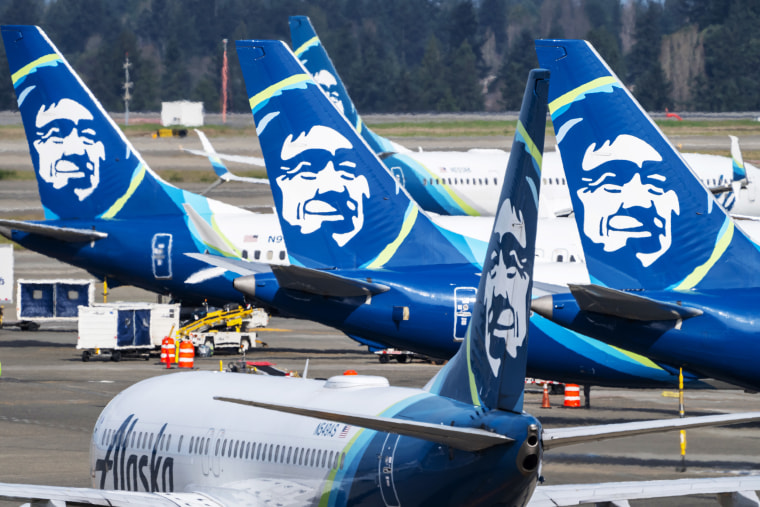
The Federal Aviation Administration lifted a ground stop for all Alaska Airlines flights Wednesday after grounding the planes earlier as a result of a computer problem at the carrier.
The Seattle-based airline said in a statement that an issue arose “while performing an upgrade to the system that calculates our weight and balance.”
The FAA initially approved a ground stop for all Alaska and Horizon flights starting at approximately 10:50 a.m. ET.
It was lifted just before 11:45 a.m. ET.
It wasn't immediately clear how many flights were affected. An Alaska spokesperson did not immediately respond to a request for comment.
Rob Wile is a breaking business news reporter for NBC News Digital.
Jay Blackman is an NBC News producer covering such areas as transportation, space, medical and consumer issues.
We’re sorry, this site is currently experiencing technical difficulties. Please try again in a few moments. Exception: request blocked

IMAGES
COMMENTS
New Zealand Consulate Salt Lake City, United States of America. Street Address 1655 Linden Lane, Bountiful, UT 84010, United States of America Telephone +1 801 237 2664 (Direct), +1 801 296 2494 (Voicemail) Email [email protected].
Exercise normal precautions in New Zealand. Read the country information page for additional information on travel to New Zealand. If you decide to travel to New Zealand: Enroll in the Smart Traveler Enrollment Program (STEP) to receive Alerts and make it easier to locate you in an emergency. Follow the Department of State on Facebook and Twitter.
SafeTravel is the official source of travel advice for New Zealanders, with advisories for specific destinations. Checking SafeTravel helps you avoid travel blackspots. On SafeTravel you can also register your details and travel plans. If a crisis occurs overseas, MFAT will contact New Zealanders who have enrolled to check on their safety and ...
register-your-travelRegister/update your travel plans Travelling or living overseas? Register with us so we can send you important information following an emergency. Login; ... Contact us. Contact us; New Zealand embassy locator; Ministry of Foreign Affairs and Trade 195 Lambton Quay Private Bag 18 901 Wellington 5045 New Zealand.
New Zealand Travel Advisory: Level 1: Exercise Normal Precautions: September 8, 2023: Papua New Guinea Travel Advisory : Level 3: Reconsider Travel: January 17, 2024: Samoa Travel Advisory : Level 1: Exercise Normal Precautions: July 24, 2023: Austria Travel Advisory: Level 1: Exercise Normal Precautions: July 26, 2023: Belarus Travel Advisory ...
All fully vaccinated United States passport holders can enter New Zealand and do not need to self-isolate or go to quarantine from 11:59pm 1 May 2022. Helpful links. Eligibility, testing and vaccination requirements to travel into New Zealand (opens in new window) Learn more about New Zealand's 5-step plan to re-open borders (opens in new window)
Find out more about our travel advisories. Travel advisory risk levels. Search for travel advisories by risk level. Before you go. COVID-19; Quick checklist and tips; ... Contact us. Contact us; New Zealand embassy locator; Ministry of Foreign Affairs and Trade 195 Lambton Quay Private Bag 18 901 Wellington 5045 New Zealand.
Level 3: Reconsider travel. Level 4: Do not travel. Under the new system, New Zealand has been reclassified as Level 3: Reconsider travel. New Zealand's Level 3 Travel Advisory is in no way a reflection on New Zealand's COVID-19 response. In fact, the U.S. Centers for Disease Control (CDC) and Prevention recognizes there is a low level of ...
Office of the Spokesperson. April 19, 2021. State Department Travel Advisory Updates. In order to provide U.S. travelers detailed and actionable information to make informed travel decisions, the Department of State regularly assesses and updates our Travel Advisories, based primarily on the U.S. Centers for Disease Control and Prevention (CDC ...
Video / NZ Herald. From RNZ. The United States' Centre for Disease Control and Prevention has raised its travel advisory warning on travel to New Zealand. The CDC updated its travel warning to the ...
Call us in Washington, D.C. at 1-888-407-4747 (toll-free in the United States and Canada) or 1-202-501-4444 (from all other countries) from 8:00 a.m. to 8:00 p.m., Eastern Standard Time, Monday through Friday (except U.S. federal holidays). See the State Department's travel website for the Worldwide Caution and Travel Advisories.
Message for U.S. Citizens: Traveller Pass for Travel to New Zealand. The New Zealand Government announced that from 11:59 pm on May 1, 2022, vaccinated visitors from visa waiver countries, and visitors from other countries who already hold a valid visitor visa can enter New Zealand and test on arrival.
The CDC updated its travel warning to 'level four: very high' for travel to New Zealand due to Covid-19 cases, of which today alone there was 23,894 new cases recorded.. According to the Reuters' Covid-19 tracker, Covid-19 infections are decreasing in United States, with 49,611 new infections reported on average each day.. The CDC states if people must travel here they should ensure they are ...
New Zealand. New Zealand has four levels of travel advisories: exercise normal safety and security precautions; exercise increased caution; avoid non-essential travel; and do not travel. Its travel advisory for the U.S. falls under level 2 of 4: Exercise increased caution. The country says this designation is "due to the threat of terrorism.".
COVID-19 testing and vaccine rules for entering the U.S. As of May 12, 2023, noncitizen nonimmigrant visitors to the U.S. arriving by air or arriving by land or sea no longer need to show proof of being fully vaccinated against COVID-19. As of June 12, 2022, people entering the U.S. no longer need to show proof of a negative COVID-19 test .
COVID-19 and international travel. This COVID-19 travel advice applies to all international travel, in all destinations. If you are planning international travel at this time, please read this advice alongside our destination specific travel advisories.. In line with step two of the Government's 5-step plan to re-open New Zealand's borders, at 11:59pm on Friday 4 th of March 2022, we ...
Nationals of all Visa Waiver Programme (VWP) countries require ESTA authorisation prior to travelling to the United States under VWP. Travellers from VWP counties, including New Zealand, are required to pay an operational and travel promotion fee when applying for ESTA. The total cost for a new or renewed ESTA will be US$14.
Israel is a very security-minded country with special ties to the United States. It issues warnings on a scale of 01 to 04, the latter being of the highest risk level. Israel's travel warnings ...
So far in 2024, the State Department made changes to the existing Level 4 advisories for Myanmar, Iran and Gaza, and moved Niger and Lebanon off of the Level 4 list. Places With a Level 4 Travel ...
Travel alerts. Be kept up to date with current travel alerts that are in effect. Find out how to receive our travel alert information. Important information about travel to and from Chicago for April 2024 -October 2025 Important information about travel to and from Chicago for April-October Disrupt Reimbursement Consideration.
If you want to fit in, swap your shorts for a pair of long pants. Photo / 123RF When visiting a new country or city, few of us wish to stand out as a tourist. So, we brush up on the local language ...
French Air Traffic Controllers Strike. Due to the call for French Air Traffic Controllers Strike, this may impact travel to/from/through the destination (s) listed below. Check flight status frequently for up-to-the-minute information about your flight plans, or get updates sent directly to your mobile device or by email with On-Time Flight ...
Information for domestic and international visitors. Some parts of New Zealand's North Island are experiencing changes to road and traffic conditions. If you are travelling please check with your travel provider, travel agent and travel insurer directly about any disruptions that may impact you. Some Auckland regional parks are temporarily ...
Last September, the U.S. Embassy in the Bahamas issued a travel alert warning Americans after a tourist from Indiana got an eight-month prison sentence for possession of ammunition.. The alert says: "We wish to remind all travelers that declaring a weapon in your luggage with an airline carrier does not grant permission to bring the weapon into TCI [Turks and Caicos Islands] and will result in ...
The Ministry of Foreign Affairs and Trade provides advice on security and safety concerns in many destinations. This advice is based on information from a number of sources. It reflects potential risks, and our assessment of what these might mean for New Zealanders. Our assessment may also take into account actions of local authorities, and our ...
The guidance provides best practices for deploying and operating externally developed artificial intelligence (AI) systems and aims to: Improve the confidentiality, integrity, and availability of AI systems. Ensure there are appropriate mitigations for known vulnerabilities in AI systems. Provide methodologies and controls to protect, detect ...
FAA lifts temporary ground stop of Alaska Airlines flights after technical issue is resolved. Alaska Airlines said in a statement that it had an issue with the system that calculates the weight ...
U.S. Embassy Nassau, The Bahamas #42 Queen Street, Nassau 1-242-322-1181 [email protected] U.S. Embassy Nassau webpage: Services for U.S. and Local Citizens - U.S. Citizen Services - U.S. Embassy in The Bahamas (usembassy.gov) For U.S. Citizens in an Emergency: Call State Department - Consular Affairs at: 1-888-407-4747 (when dialing ...